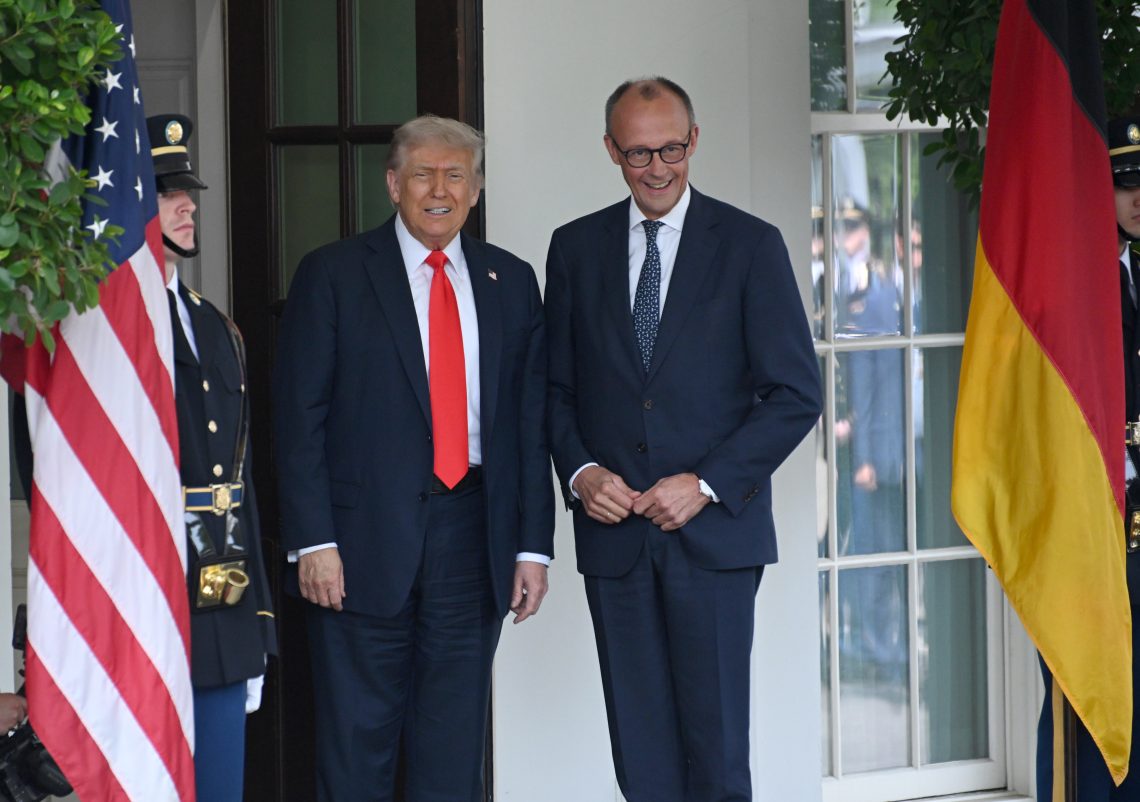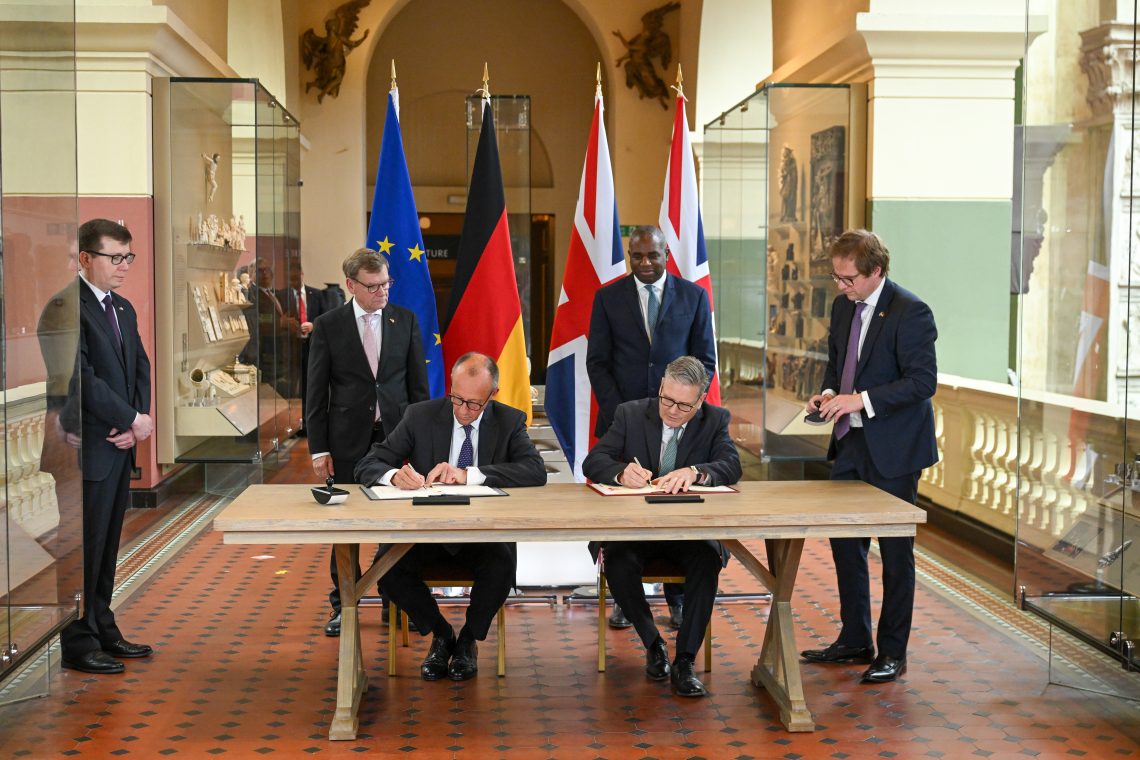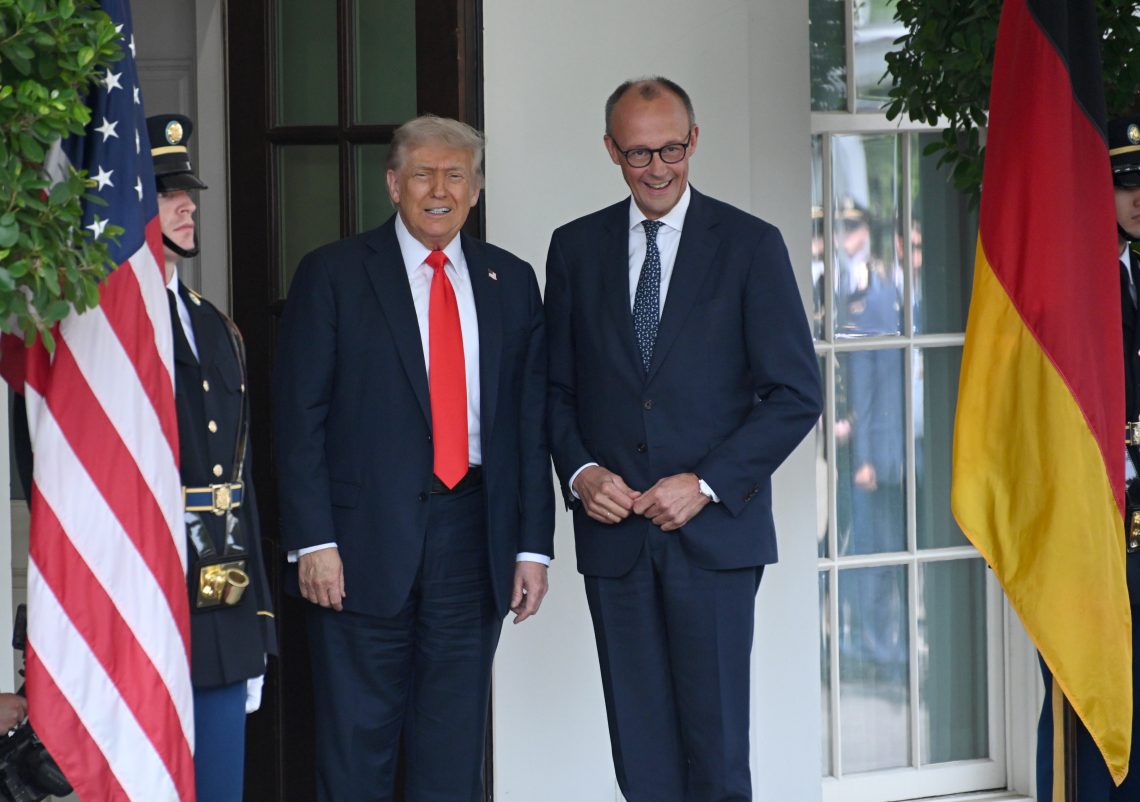German-American ties have strengthened under Chancellor Merz, fostering cooperation despite lingering political and strategic differences.
 June 5: U.S. President Donald Trump (left) greets German Chancellor Friedrich Merz (right) at the White House. © Getty Images
June 5: U.S. President Donald Trump (left) greets German Chancellor Friedrich Merz (right) at the White House. © Getty Images
×In a nutshell
- Berlin and Washington align on NATO, Ukraine and defense commitments
- Immigration and energy policies also show growing policy convergence
- Political frictions remain, but pragmatic diplomacy is prevailing
Throughout most of the post-World War II era, solid German-United States bilateral relations have been one of the strongest bonds in the transatlantic community. There have always been ups and downs, particularly over the last decade. Until recently, contentious relations with the German government marked both of Donald Trump’s terms as U.S. president.
Yet, since Friedrich Merz of the Christian Democratic Union (CDU) became chancellor of Germany in early May, relations have markedly improved. It is likely that cooperation between Berlin and Washington will continue to deepen during Mr. Trump’s term, despite several political differences and the U.S. president being a controversial figure in Germany.
Regional security
Undoubtedly, one factor driving convergence is the difference in Washington and Berlin’s perspectives on transatlantic security. Chancellor Merz heads a fractious left-right coalition, but there is general consensus in support of Ukraine, a strong NATO and substantial commitments for defense. Meanwhile, if there is one clear and unambiguous signal from the U.S., it is the expectation that Europeans need to contribute significantly more to European defense and bear the lion’s share of the burden in supporting Ukraine. While these positions appear to align the two administrations, there are uncertainties and questions on both sides.
Even before his reelection, there were persistent claims from Europeans that the U.S. intended to abandon NATO and Ukraine while accommodating Russian interests. On the American side, there were incessant doubts that NATO members would agree to responsible defense targets and support President Trump’s initiative to negotiate a ceasefire to Russia’s war on Ukraine. Both leaders quickly established trust and confidence that their interests aligned. Chancellor Merz has been a strong vocal supporter of the NATO defense targets and has pressed for significant increases in German military spending. For his part, President Trump has expressed satisfaction with the decisions made at the June NATO summit held at The Hague.
After Russian President Vladimir Putin rebuffed U.S. efforts to negotiate a ceasefire, President Trump signaled his intention to support Ukraine and further isolate and punish the Russian regime.
 July 17: Chancellor Merz (seated left) and UK Prime Minister Keir Starmer (seated right) with their foreign ministers during the signing of the Anglo-German Treaty on Friendship and Bilateral Cooperation at the Victoria and Albert Museum in London, UK. © Getty Images
July 17: Chancellor Merz (seated left) and UK Prime Minister Keir Starmer (seated right) with their foreign ministers during the signing of the Anglo-German Treaty on Friendship and Bilateral Cooperation at the Victoria and Albert Museum in London, UK. © Getty Images
In July, the governments of Germany and the United Kingdom signed a mutual defense pact while bilateral cooperation between Germany and France continues to grow. For many, this reflects a German backup plan for security should the U.S. withdraw from its commitments to Europe. That seems less a factor in German policy than an effort by Berlin to reassert its traditional Cold War role as a major contributor and leader in European defense. Indeed, Washington has been supportive of bilateral security agreements among NATO allies (which the U.S. also maintains) to strengthen the underlying foundation of the alliance.
Some American officials have asserted that European security is no longer a “vital interest” of the U.S. Yet that statement no longer appears to rattle German officials, who dwell less on semantics and rhetoric than on U.S. actions, such as the Trump administration agreeing to sell weapons systems for use in Ukraine or its reaffirmed commitment to NATO, which have strengthened rather than weakened Europe’s deterrent structure.
The German position is not to accommodate President Trump, but to align the strengths of the two countries.
Moreover, German actions seem to acknowledge that in the near- to mid-term, there is no possibility for a European defense system to replace NATO nor is there a NATO without the U.S. The German position is not to accommodate President Trump, but to align the strengths of the two countries, perhaps recreating some of the conditions that made it one of America’s most valued allies during the Cold War and a recognized leader in European security.
One area of closer cooperation will likely be in the defense sector. Germany is looking to ramp up its defense-industrial base to offset the decline in the automotive manufacturing sector. Much of this will be done in coproduction and partnership with U.S. entities. Both Germany and the U.S. increasingly see a strong defense-industrial production base as a pillar of conventional deterrence against foreign threats and aggression.
Transatlantic issues and politics
There are key issues on which Chancellor Merz has supported policies that have long been popular with the U.S. president and many of his supporters. For instance, his government has recently adopted tougher immigration policies, a signature issue for the Trump administration.
Chancellor Merz advocated for the recent U.S.-European Union trade negotiations, which President Trump touted as “the biggest trade deal ever made.” Berlin’s energy policies are heading in the pragmatic direction favored by Washington. Germany’s support for Israel mirrors the U.S. position.
While the two leaders agree on some core issues, wide political differences remain between Germany’s center-right political parties and many American conservatives. Some in the American conservative movement argue that the future of transatlantic cooperation depends on a closer alignment between the U.S. and European right. Nevertheless, support from Americans for the European populists rankles some Europeans, including center-right parties such as Chancellor Merz’s CDU.
Read more by national security and foreign policy expert James Jay Carafano
This friction was most clearly seen during recent national elections in Germany and Romania, where some American conservatives, including Vice President JD Vance and erstwhile advisor to the president, Elon Musk, strongly advocated for the Alternative for Germany (AfD) and the Alliance for the Union of Romanians (AUR). Following the statements, President Trump signaled to both countries after the elections that he was interested in pursuing strong bilateral relations regardless of the electoral outcome.
Recently, U.S. Secretary of State Marco Rubio instructed diplomats worldwide not to comment on the fairness or integrity of elections. The implication was that it is not U.S. policy to try to make Europe more conservative by supporting certain political parties at the expense of others. Rather, President Trump’s intent is to foster pragmatic bilateral ties even with governments like those in the UK and Poland where the political views of the governing parties differ from those of American conservatives. The MAGA movement may continue to push for prioritizing international cooperation with like-minded conservative political groups, but that does not look to be official U.S. policy. For many governments, including in Germany, this removes a potential irritant in bilateral relationships with the U.S.
×
Scenarios
Most likely: U.S.-Germany relations remain solid
There is no question that many in Europe still doubt President Trump’s commitment to the transatlantic community. Meanwhile, in Washington, voices are calling for the U.S. to decisively shift its interests away from Europe toward countering China in the Indo-Pacific. Yet, the relationship President Trump has established with key center-right conservative leaders in Europe, including Chancellor Merz and Italian Prime Minister Giorgia Meloni, suggests the White House intends to remain a prominent transatlantic power and a constructive partner for Europe.
In the near term, there are several bilateral issues that will determine the pace at which Chancellor Merz and President Trump can build political bridges of trust and confidence as well as joint action between Washington and Berlin. Support for Ukraine will remain a bellwether issue. The German government will be closely monitoring the outcome of the Pentagon’s force-posture review, which is expected by early autumn, and the report’s implications for German and European security. Recently, the U.S. indicated a willingness for input and consultations on the review.
Another issue that will likely interest both the U.S. and Germany is the possibility of working together on new initiatives in the Balkans. Both governments increasingly view the future implementation of the Dayton Accords with skepticism and are looking for new paths forward.
Less likely: Bigger difficulties arise for the U.S. and Germany
Polish relations could be another wild card in the U.S.-German bilateral relationship. With Polish governance split between a conservative president and a center-left prime minister, Washington and Berlin could struggle to find common ground with Central Europe’s most important economic and military power. Yet this is unlikely, because Polish officials across the political spectrum, like Germany’s government, share concerns about Russian aggression and the need for increased deterrence.
The challenge of China remains a major test for the alignment of U.S. and German leadership in the transatlantic community. Berlin, like Brussels, is struggling to find a course to reduce economic and strategic dependencies on China while also trying to reignite economic growth.
Contact us today for tailored geopolitical insights and industry-specific advisory services.

Sign up for our newsletter
Receive insights from our experts every week in your inbox.
